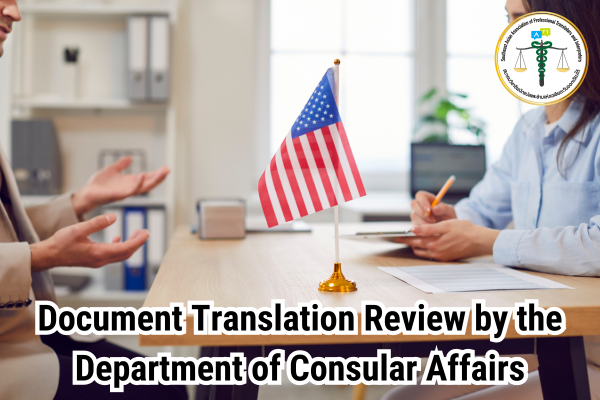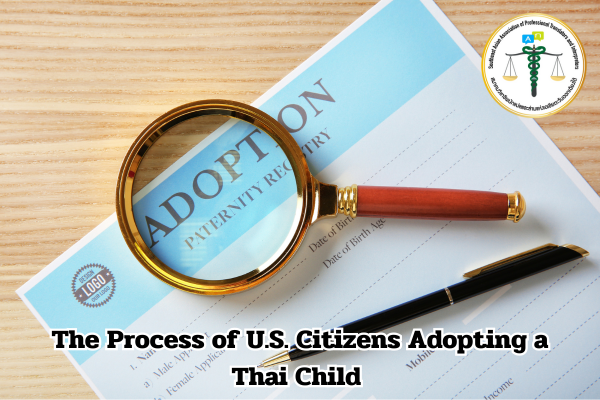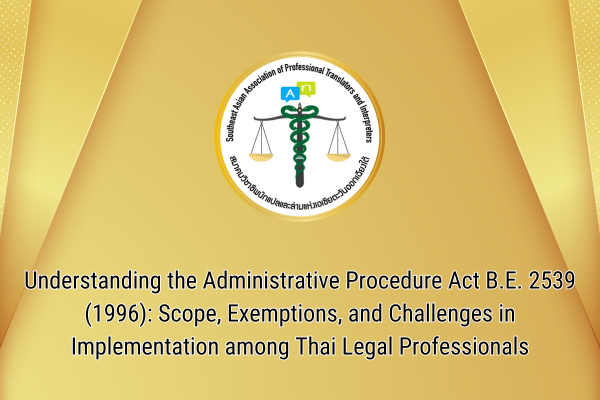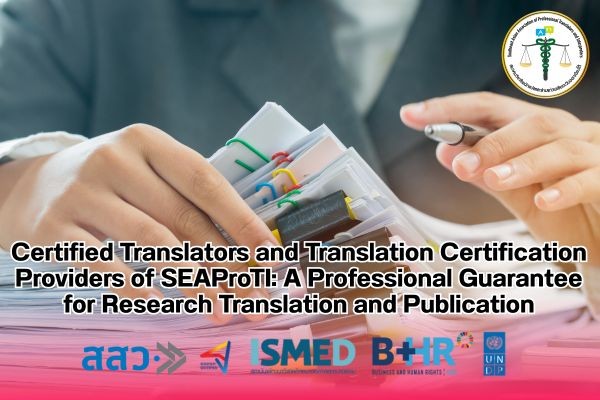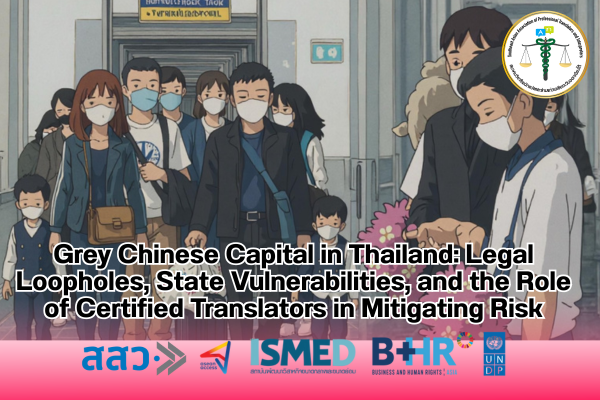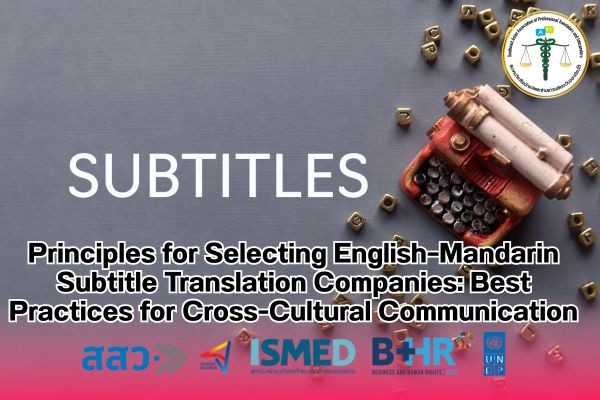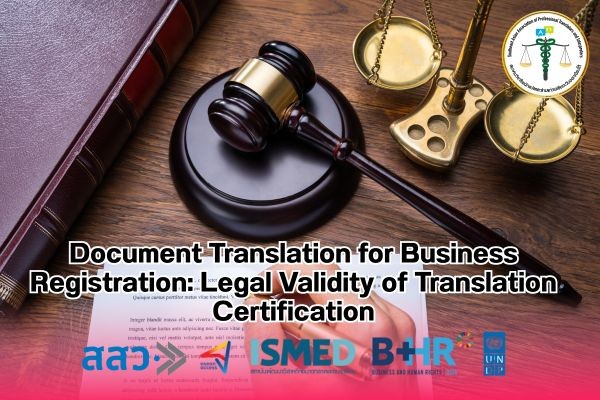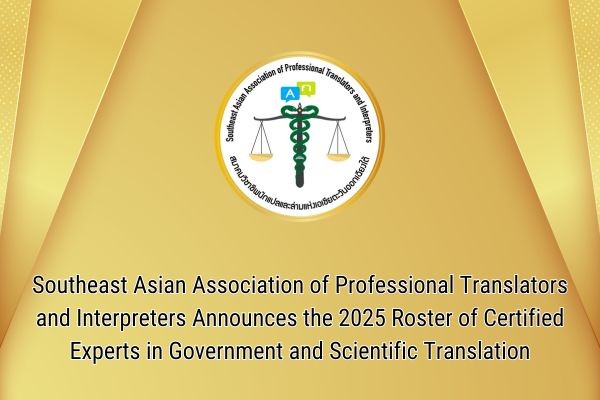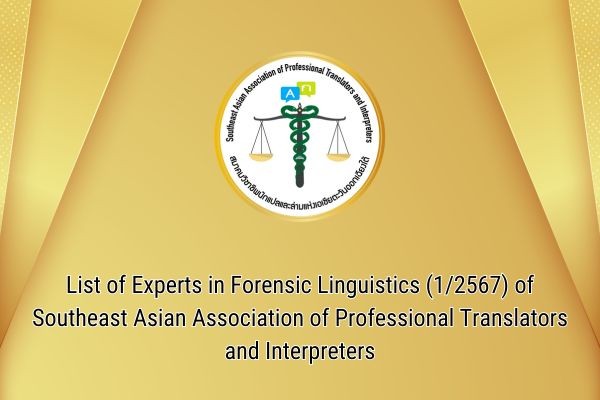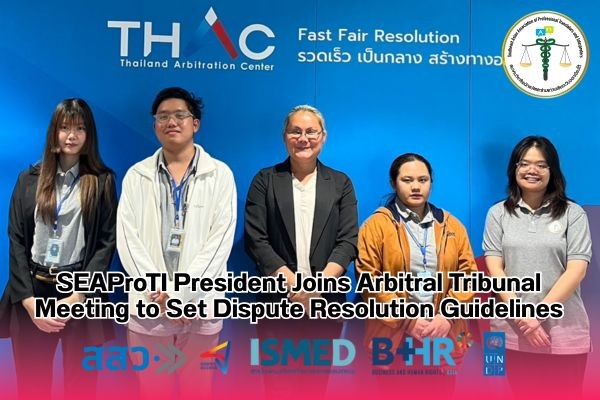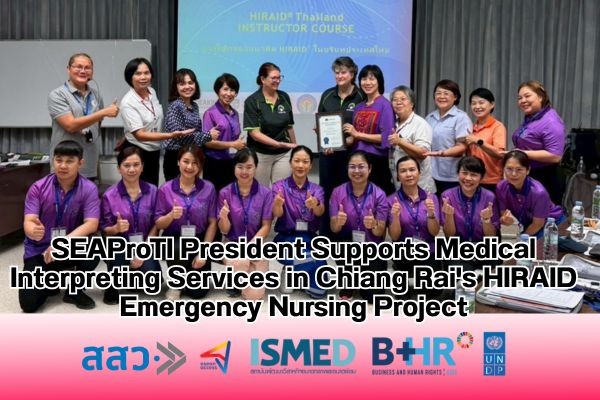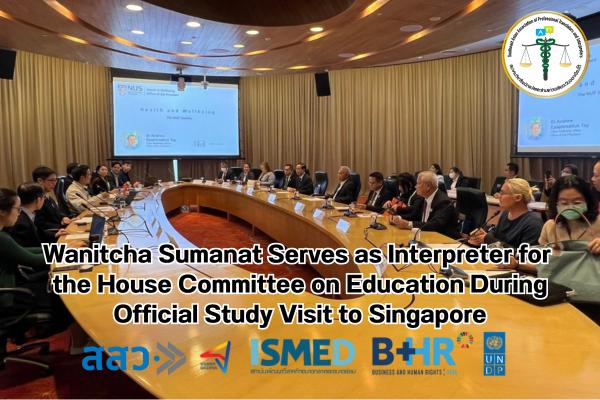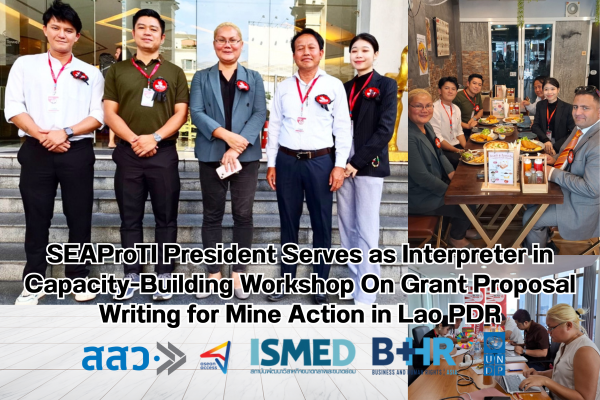Document Translation Review by the Department of Consular Affairs: Guidelines and Key Insights
7 January 2025, Bangkok – Document translation plays a crucial role in notarization and official certification processes in Thailand. The Department of Consular Affairs under the Ministry of Foreign Affairs holds the responsibility of reviewing and certifying translations to ensure they align accurately with the original documents and are fit for legal or administrative use. While the Department of Consular Affairs maintains clear standards for translation review, it is essential to understand that these reviews are not intended to serve as benchmarks for evaluating translations in other contexts, such as professional translation examinations administered by the Southeast Asian Association of Professional Translators and Interpreters (SEAProTI).
Translation Review Guidelines of the Department of Consular Affairs
The Department of Consular Affairs follows comprehensive guidelines to ensure consistency and accuracy in document translation reviews. These include:
- Alignment with the Original Document: Translations must precisely match the content and meaning of the original document. Officials thoroughly examine each word and structure to verify accuracy, ensuring the document’s usability in legal and administrative proceedings.
- Use of Guidelined Templates: The Department provides sample translations for essential documents, such as civil registration and family registration forms. These templates serve as guidelines to help translators and reviewers achieve consistent quality and accuracy.
- Revisions Based on Reviewers’ Input: Translations that do not adhere to the Department’s guidelines are subject to revisions. Only documents amended to align with the reviewers’ feedback are eligible for certification.
Limitations of Translation Review as a Benchmark
While the Department of Consular Affairs operates with well-defined standards, their translation reviews are not designed to assess translation quality in broader contexts, such as SEAProTI’s professional translator certification. Key limitations include:
- Subjectivity in Reviewer Decisions: Translation revisions often depend on the reviewers’ experience and interpretation, which can vary between individuals. This introduces an element of subjectivity into the process.
- Focus on Administrative Use: The Department’s reviews prioritize compliance with the specific requirements of Thai administrative and legal systems. They do not aim to evaluate broader linguistic or contextual competence.
- SEAProTI’s Distinct Standards: SEAProTI has its own rigorous evaluation system tailored to assess professional translation skills. Candidates must meet the Association’s specific standards, which differ significantly from the criteria used by the Department of Consular Affairs.
SEAProTI Translator Examination
The Southeast Asian Association of Professional Translators and Interpreters (SEAProTI) plays a pivotal role in setting benchmarks for professional translation within the region. Its certification exams are designed to assess candidates’ abilities comprehensively:
- Examination Standards: SEAProTI focuses on evaluating nuanced translation skills, including contextual understanding, linguistic accuracy, and the ability to convey meaning fluently. These criteria go beyond the technical accuracy emphasized by the Department of Consular Affairs.
- Holistic Assessment: Candidates are judged on multiple dimensions, such as content accuracy, language fluency, and contextual appropriateness. This ensures that the certified translators meet high professional standards.
- Compliance with SEAProTI Guidelines: Candidates must strictly adhere to SEAProTI’s examination requirements. Translations reviewed or amended by the Department of Consular Affairs cannot be used as benchmarks in this context.
Key Points to Remember About Translation Standards
The Department of Consular Affairs Does Not Define Professional Translation Standards: While its reviews ensure the accuracy of administrative documents, they are not intended to evaluate translators’ overall capabilities.
- SEAProTI’s Rigorous Standards: SEAProTI’s assessments are designed to evaluate professional-level translation skills, focusing on broader linguistic and contextual competence.
- Revisions Based on Reviewers’ Judgments: In many cases, translations reviewed by the Department of Consular Affairs are adjusted to match the specific preferences or interpretations of individual reviewers. These adjustments are context-specific and cannot serve as universal benchmarks.
Professional Development for Translators
For aspiring professional translators, it is crucial to understand the distinct standards set by SEAProTI and other international organizations. Preparing for SEAProTI certification involves:
- Understanding Examination Requirements: Study SEAProTI’s guidelines to grasp the competencies expected of professional translators, including linguistic accuracy, contextual awareness, and cultural sensitivity.
- Gaining Practical Experience: Regular practice with diverse texts and receiving feedback from seasoned professionals can enhance translation skills and prepare candidates for rigorous evaluations.
- Continuous Learning: Participating in training programs, workshops, and seminars offered by SEAProTI and other professional associations helps translators stay updated on industry standards and trends.
Conclusion
The translation review process of the Department of Consular Affairs is structured to ensure the accuracy and reliability of administrative documents. However, it is essential to recognize that these reviews are context-specific and not intended to serve as benchmarks for professional translation assessments like those conducted by SEAProTI. For translators aiming to achieve professional certification, understanding and adhering to SEAProTI’s distinct standards is paramount.
By focusing on professional development and meeting high industry standards, translators can build credibility and excel in their careers, contributing to the global demand for accurate and culturally sensitive translation services.
About SEAProTI’s certified translators, translation certification providers, and certified interpreters:
The Southeast Asian Association of Professional Translators and Interpreters (SEAProTI) has officially announced the criteria and qualifications for individuals to register as “Certified Translators,” “Translation Certification Providers,” and “Certified Interpreters” under the association’s regulations. These guidelines are detailed in Sections 9 and 10 of the Royal Thai Government Gazette, issued by the Secretariat of the Cabinet under the Office of the Prime Minister of the Kingdom of Thailand, dated July 25, 2024, Volume 141, Part 66 Ng, Page 100.
To read the full publication, visit: the Royal Thai Government Gazette
การตรวจคำแปลเอกสารของกรมการกงสุล: แนวทางในการปฏิบัติและข้อเท็จจริงที่ควรรู้
7 มกราคม 2568, กรุงเทพมหานคร – การตรวจคำแปลเอกสารเป็นกระบวนการสำคัญที่เกี่ยวข้องกับการนิติกรณ์และการรับรองเอกสารในประเทศไทย โดยกรมการกงสุล กระทรวงการต่างประเทศ มีหน้าที่ตรวจสอบคำแปลเอกสารเพื่อให้สอดคล้องกับต้นฉบับและสามารถใช้ในกระบวนการทางกฎหมายหรือราชการได้อย่างถูกต้อง แม้ว่าการตรวจสอบคำแปลของกรมการกงสุลจะมีมาตรฐานที่ชัดเจน แต่สิ่งสำคัญที่ต้องเข้าใจคือ การตรวจคำแปลในลักษณะนี้ไม่สามารถนำมาใช้เป็นมาตรฐานเพื่อวัดคุณภาพของการแปลในบริบทอื่น เช่น การสอบนักแปลของสมาคมวิชาชีพนักแปลและล่ามแห่งเอเชียตะวันออกเฉียงใต้ (SEAProTI)
แนวทางในตรวจสอบคำแปลของกรมการกงสุล
กรมการกงสุลมีแนวทางการดำเนินงานที่ครอบคลุม เพื่อให้การตรวจสอบคำแปลมีมาตรฐานและสอดคล้องกันทั่วทั้งองค์กร:
- ความสอดคล้องกับต้นฉบับ: คำแปลเอกสารต้องแปลให้ตรงตามความหมายของต้นฉบับทุกประการ โดยเจ้าหน้าที่จะตรวจสอบความถูกต้องในระดับคำและโครงสร้าง เพื่อให้เอกสารสามารถใช้งานได้ในกระบวนการทางกฎหมาย
- ตัวอย่างแบบฟอร์ม: กรมการกงสุลจัดทำตัวอย่างคำแปลสำหรับเอกสารสำคัญ เช่น การทะเบียนราษฎร การทะเบียนครอบครัว เพื่อช่วยให้นักแปลและผู้ตรวจสอบมีแนวทางที่ชัดเจนในการปฏิบัติงาน
- การแก้ไขตามผู้ตรวจ: ในกระบวนการตรวจสอบ คำแปลที่ไม่สอดคล้องกับแนวทางของผู้ตรวจจะถูกแก้ไข และเอกสารที่ผ่านการแก้ไขแล้วเท่านั้นจึงจะได้รับการรับรอง
ข้อจำกัดในการใช้คำแปลที่ตรวจสอบโดยกรมการกงสุล
แม้ว่ากรมการกงสุลจะมีมาตรฐานที่ชัดเจน แต่การตรวจคำแปลโดยเจ้าหน้าที่กรมการกงสุลไม่สามารถนำมาใช้เป็นมาตรฐานเพื่อวัดคุณภาพของการแปลในบริบทอื่น เช่น การสอบของ SEAProTI ทั้งนี้เนื่องจาก:
- ขึ้นอยู่กับดุลยพินิจของผู้ตรวจ: การแก้ไขคำแปลในบางครั้งอาจขึ้นอยู่กับประสบการณ์และความเข้าใจของผู้ตรวจ ซึ่งอาจแตกต่างกันไปในแต่ละบุคคล
- ไม่ได้เป็นมาตรฐานสากล: การตรวจคำแปลของกรมการกงสุลเน้นความถูกต้องในบริบทของเอกสารทางราชการไทย แต่ไม่ได้ออกแบบมาเพื่อครอบคลุมทุกแง่มุมของการแปลในระดับมืออาชีพ
- การสอบของ SEAProTI มีมาตรฐานเฉพาะ: ผู้สมัครสอบนักแปลของ SEAProTI จะต้องตอบข้อสอบตามมาตรฐานที่สมาคมกำหนด ซึ่งมีเป้าหมายเพื่อประเมินความสามารถในการแปลในระดับวิชาชีพ ไม่ใช่เพียงการแปลเอกสารทางราชการเท่านั้น
การสอบนักแปลของ SEAProTI
สมาคมวิชาชีพนักแปลและล่ามแห่งเอเชียตะวันออกเฉียงใต้ (SEAProTI) มีบทบาทสำคัญในการกำหนดมาตรฐานสำหรับนักแปลในภูมิภาค โดยการสอบของสมาคมมุ่งเน้นที่การประเมินทักษะการแปลในระดับมืออาชีพ:
- มาตรฐานการสอบ: การสอบของ SEAProTI เน้นการประเมินความสามารถในการแปลอย่างละเอียด รวมถึงความเข้าใจในบริบทและความเหมาะสมของภาษา ซึ่งเป็นมาตรฐานที่แตกต่างจากการตรวจคำแปลของกรมการกงสุล
- การประเมินผล: ผู้สมัครสอบจะถูกประเมินตามเกณฑ์ที่กำหนดโดยสมาคม ซึ่งครอบคลุมทั้งความถูกต้องของเนื้อหา ความลื่นไหลของภาษา และความสามารถในการสื่อความหมายได้อย่างชัดเจน
- ข้อกำหนดเฉพาะ: ผู้สมัครสอบจำเป็นต้องปฏิบัติตามข้อกำหนดของสมาคมเท่านั้น โดยไม่สามารถอ้างอิงการตรวจคำแปลจากกรมการกงสุลเป็นมาตรฐานได้
ข้อพึงระวังเกี่ยวกับการแปลเอกสาร
กรมการกงสุลไม่ได้กำหนดมาตรฐานสำหรับนักแปลทั่วไป: การตรวจคำแปลโดยเจ้าหน้าที่กรมการกงสุลมีวัตถุประสงค์เพื่อความถูกต้องในบริบทของเอกสารราชการ แต่ไม่ได้ออกแบบมาเพื่อประเมินความสามารถของนักแปลในระดับมืออาชีพ
- มาตรฐานของ SEAProTI: การแปลที่ผ่านการตรวจสอบของ SEAProTI มีมาตรฐานสูงกว่า เนื่องจากครอบคลุมทั้งทักษะด้านภาษาและความเข้าใจในบริบทที่หลากหลาย
- การแก้ไขคำแปลตามผู้ตรวจ: ในบางกรณี คำแปลอาจถูกแก้ไขให้สอดคล้องกับความเห็นของผู้ตรวจของกรมการกงสุล ซึ่งไม่สามารถใช้เป็นเกณฑ์วัดความถูกต้องในบริบทอื่นได้
บทสรุป:
การตรวจคำแปลของกรมการกงสุลเป็นกระบวนการที่มีมาตรฐานและแนวทางชัดเจน แต่ควรเข้าใจว่าเป้าหมายหลักคือการรับรองความถูกต้องของเอกสารราชการ ไม่ใช่การวัดความสามารถของนักแปลในระดับวิชาชีพ การแปลที่ผ่านการตรวจสอบโดย SEAProTI มีความแตกต่างอย่างมีนัยสำคัญ โดยเน้นไปที่มาตรฐานที่ครอบคลุมในระดับสากลและวิชาชีพ
สำหรับผู้ที่ต้องการเข้าสู่วงการแปลในระดับมืออาชีพ การศึกษามาตรฐานของ SEAProTI และการเตรียมตัวสอบตามเกณฑ์ที่กำหนดจะช่วยให้คุณประสบความสำเร็จและก้าวไปสู่การเป็นนักแปลมืออาชีพที่มีคุณภาพสูงสุด
อ่านบทความเพิ่มเติม: เมื่อพนักงานตรวจคำแปลของกรมการกงสุลตรวจแก้คำว่า “Sub-district” เป็น “Sub-area”
เกี่ยวกับนักแปลรับรอง ผู้รับรองการแปล และล่ามรับรองของสมาคมวิชาชีพนักแปลและล่ามแห่งเอเชียตะวันออกเฉียงใต้
สมาคมวิชาชีพนักแปลและล่ามแห่งเอเชียตะวันออกเฉียงใต้ (SEAProTI) ได้ประกาศหลักเกณฑ์และคุณสมบัติผู้ที่ขึ้นทะเบียนเป็น “นักแปลรับรอง (Certified Translators) และผู้รับรองการแปล (Translation Certification Providers) และล่ามรับรอง (Certified Interpreters)” ของสมาคม หมวดที่ 9 และหมวดที่ 10 ในราชกิจจานุเบกษา ของสำนักเลขาธิการคณะรัฐมนตรี ในสำนักนายกรัฐมนตรี แห่งราชอาณาจักรไทย ลงวันที่ 25 ก.ค. 2567 เล่มที่ 141 ตอนที่ 66 ง หน้า 100 อ่านฉบับเต็มได้ที่: นักแปลรับรอง ผู้รับรองการแปล และล่ามรับรอง


